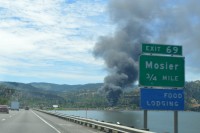By Dan Serres, Conservation Director
This fall, Riverkeeper is teaming up with its allies in the Stand Up to Oil Coalition and Portland activists to tackle the issue of oil trains from both ends of the Columbia River Gorge. Already, Riverkeeper and the Stand Up to Oil Coalition have made a compelling case against the largest oil-by-rail terminal in North America, proposed in Vancouver. But we aren’t stopping there: we are using our momentum to stop additional oil trains in Portland and in Mosier.
In Portland, activists have been pushing for clear, binding new city rules that would prohibit new facilities whose primary purpose is transporting fossil fuel infrastructure. Portland’s City Council passed a landmark fossil fuel resolution in 2015, and City Staff have worked to translate the resolution into binding code language. In September and October, thanks to testimony from hundreds of Portland activists, the Planning and Sustainability Commission recommended draft code language that would bar any new facilities with the ability to accept a unit train of oil. Yet, the Planning and Sustainability Commission opened the door to small expansions in existing facilities – a mistake that we will be asking the City Council to correct in November.
Please plan to attend the City’s final public hearing on its fossil fuel ban – an important policy for stemming the flow of oil trains through Oregon.
- Portland City Council public hearing on the Fossil Fuel Transport policy
- Thursday, November 10, 2016, at 2:00 pm (Please arrive early and wear red!)
- Portland City Hall: 1221 SW Fourth Avenue, Portland, Oregon

Further upstream, in September hundreds of people urged the Wasco County Planning Commission to reject a request from Union Pacific to expand its tracks through Mosier for oil and coal trains – the same location where in June 20016 an oil train derailment, spill, and fire polluted the Columbia River and continues to contaminate groundwater. Despite overwhelming testimony in opposition to the track expansion from tribal leaders, the City of Mosier, Gorge residents, and oil train opponents from Portland and Vancouver, Wasco County’s Planning Commission approved Union Pacific’s request. Friends of the Columbia Gorge, Riverkeeper, and others are teaming up to appeal the approval, a decision that could uncork an increased flow of oil and coal trains through the Columbia River Gorge.
To get people up to speed about the ongoing effort to stop dangerous, polluting oil trains, Riverkeeper is partnering with Friends of the Gorge, 350 PDX, and Patagonia to provide an update on the oil-by-rail issue this week.
- Last Train! Learn More to Stop Oil Trains in Portland
- Thursday, October 27, 2016, doors at 7:00 PM, panel at 7:30 PM
- Patagonia Store: 907 NW Irving St, Portland, Oregon
At the event, Riverkeeper will join with our Stand Up to Oil coalition partners at Patagonia’s Portland store to present an update and panel discussion on the risks posed by dangerous oil trains in Portland and the Columbia River Gorge. Panelists include Alysia and Elke Littleaf, flyfishing guides and members of the Warm Springs tribe who have visited North Dakota in support of the Standing Rock Sioux and spoken out against oil, coal, and Nestle development in the Gorge. Other panelists include Riverkeeper’s Senior Organizer Jasmine Zimmer-Stucky, Ryan Rittenhouse of Friends of the Gorge, and Mia Reback of 350 PDX.



